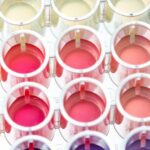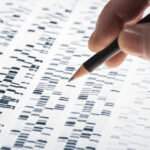Megan Cartwright
Megan gained a PhD in Toxicology from the University of Washington and is an experienced scientific and technical writer/editor.
Articles by Megan Cartwright
Gloves protect your skin from the numerous hazards lurking in labs. To help you stay safe, we’ll review the many lab glove types, then give you some handy tips on double-gloving, working with liquid nitrogen, coping with latex allergies, and how to best follow glove etiquette.
To help you keep safe and sound, we’ll review the most common types of PPE for the face and eyes, and give you some pointers on when (and when not!) to use them.
When working with proteins, accurate protein quantification is key for getting reliable data. Here are the top 5 quantification assays.
It’s all too easy to forget how many common lab chemicals are dangerous. Read on, as we bring you even more dangerous lab chemicals that you should not be messing with.
With hazards all around, it’s easy to forget how deadly even common chemicals in the lab are. But don’t worry—we’ve compiled a list of common, dangerous chemicals to help you out.
Like graduate students, proteins are sensitive to rough handling. This is particularly true when they (the proteins, not the students!) are being concentrated, purified, and stored. We’ve covered the many options out there for concentrating your proteins, along with how to handle protein extracts to keep your proteins safe from degradation. But proteins can degrade…
Whether you’re doing a quick Miniprep or labeling hundreds of PCR tubes, listening to science podcasts can help keep you sane, entertained, and informed! With so many podcasts out there, we’ve pulled together this list of twelve great options: 1. 60-Second Science (1 – 2 minutes, updated weekdays) This Scientific American podcast offers quick news about…
Detergents are all around us in the lab – and that’s a good thing! Thanks to their chemical structure, detergents can solubilize and interact with many types of molecules, making them vital to research. To show you why detergents are such a good thing for scientists, we’ll go through six examples in molecular biology where…
What do cell lysis, clean dishes, and gallbladders all have in common? Answer: detergents! These useful chemicals can solubilize fats and other proteins in water. They are the key to applications as varied as lysing cell membranes, extracting DNA, and solubilizing proteins for gel electrophoresis. To help you understand these important chemicals, we provide a…
Your lab is full of non-chemical hazards that can explode, stab, kill, and – as if that wasn’t enough – bite. Here’s a list of those hazards to remind you why Environmental Health & Safety exists! 1. Centrifuges Centrifuges are dangerous, especially when not cared for! An unmaintained ultracentrifuge imploded in an American lab in…
Grad school is a big investment of your time, with a lot riding on a successful relationship with your mentor. Unfortunately, you may have realized that the relationship is not working and resists improvement. You’ve taken the steps to switch to a new mentor. Now comes the hardest part. What do you actually say to…
Much of your success and happiness in grad school depends on an effective relationship with your mentor. Despite your best efforts, sometimes the first relationship doesn’t work out, and you need to switch mentors to succeed in your program. But how do you prepare to change mentors mid-PhD? Step 1: Write it all down Before…
Grad school is a long, hard, long, time-consuming, and–wait for it–long process. A bad relationship with your primary mentor can make it worse, and may even drive you away from a science career. Unfortunately, you often can’t spot incompatibility until you’ve spent time with a mentor and lab. Even then, how do you tell the…
As biological catalysts, enzymes transform target substrates into products. Enzyme kinetics is the rate of that transformation. By understanding how an enzyme’s behavior is affected, you can figure out how it functions in physiology or fails to function in disease. Now it gets complicated… What Affects an Enzyme’s Kinetics? In the first place, most enzymes…
The Basic Local Alignment Search Tool (BLAST) algorithm is at the heart of a free suite of online resources available through the National Center for Biotechnology Information (NCBI). While most researchers are aware of BLAST as a sequence alignment tool, NCBI’s BLAST suite offers so much more! I’ll cover in-depth how to use these resources…
2D gel electrophoresis (2DE) is a key technique for purifying individual proteins from complex samples based on their isoelectric points and molecular weights. Simple enough in theory, but as the plethora of protocols and articles shows, 2DE demands patience and meticulous optimization. But whether your samples are human sera or HUVEC lysates, 2DE uses these…
For scientists, Photoshop is a double-edged sword with a dagger nailed to the hilt. Its power in image processing is unrivalled; its ability to gut you with ethics violations is unmatched. An earlier article outlined how to keep your conscience clean when Photoshopping, here we offer four tips that will help walk with the Photoshop balancing…
Proteases: wild, mysterious, destructive. What are these untamed elements ravaging your precious lysate? How can a drop of EDTA or a smidge of “cocktail” protect that sample, which is gently cradling your hopes, your dreams, and your desire to survive the next lab meeting? Brace yourself for a biochem flashback: in this article, we’ll explain…
How often have you torn apart the lab looking for the reagent you need right now for some thawing samples? That reagent which you (possibly) ordered a week ago and which (maybe) came in yesterday? If your answer isn’t “just once in my entire career,” please read on! I will outline four steps to setup…

















